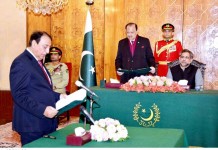ISLAMABAD: The Supreme Court on Friday released its detailed judgment in the Hudaibiya Paper Mills case involving allegations of Rs 1.2 billion money laundering against ousted prime minister Nawaz Sharif and his family members.
The court in its 36-page detailed verdict authored by
Justice Qazi Faez Isa held
that Sharif family was denied due process in the Rs 1.2 billion Hudaibiya Paper Mills reference and the judges of the Lahore High Court (LHC) were justified in quashing the reference.
The court held
that it had dismissed the case as the reference had exceeded its expiry date and
that the matter had died its deat
h while it was being dragged through various courts for years.
Earlier on December 15, 2017, a three-member Supreme Court bench comprising
Justice Mushir Alam,
Justice Qazi Faez Isa and
Justice Mazhar Alam Khan Miankhel had dismissed the appeal of the National Accountability Bureau (NAB) against the LHC verdict of quashing the Hudaibiya Paper Mills reference against the Sharif family.
On Sep 20, 2017, NAB had filed an appeal in the Supreme C
ourt, requesting it to set aside the LHC’s 2014 verdict quashing the Hudaibiya Paper Mills reference against the members of Sharif family.
The detailed verdict held
that Sharif family members were denied the right to vindicate themselves. “In this case, we have come to the painful conclusion
that respondents 1 to 9 were denied due process,” the court ruled, adding
that the legal process was abused by keeping the reference pending indefinitely and unreasonably.
The verdict noted
that the reference practically died its death in the accountability c
ourt, adding
that NAB had filed an appeal after 1,229-day delay and never provided any solid reason for why it dragged the matter out for so long.
The court noted
that the reference served no purpose but to oppress the Sharif family members. The court also noted with grave concern the lack of commitment and earnestness on the part of NAB at the relevant time.
“NAB did not produce the accused in court; NAB did not seek to have charges framed against them; NAB did not examine a single witness and tender evidence; NAB sought innumerable adjournments; NAB sought the reference to be indefinitely (sine die) adjournment,” the verdict maintained.
The court observed
that for over four years the NAB chairman did not submit an application under his signature for the restoration of the reference. “And, when the chairman did submit such an application it was not pursued and the reference remained moribund,” the verdict held.
The apex court ruled
that the LHC judges were justified in quashing the reference and once it was quashed the question of reinvestigation did not arise. It said one LHC judge permitted reinvestigation, despite NAB had not requested it. However,
that judge also gave no reason why he permitted reinvestigation. “We also agree with the reasons articulated by the LHC judge who did not agree on the matter of reinvestigation,” the verdict said. The verdict dismissed NAB’s claim
that Nawaz Sharif and Shahbaz Sharif had themselves been responsible for the delay in the case being pursued. It held
that this claim was found to be contrary to the facts. The court observed
that Sharif family was deprived of their right to defend themselves.
The court held
that the statement of Ishaq Dar under Section 164 of CrPC against the Sharif family should have been recorded in their presence and they should have been given the opportunity to cross-examine Dar. “As this was not done, the law does not permit its use against the Sharif family,” the court ruled.
The verdict noted
that during the course of hearings, it was observed
that most of the media acted maturely and fairly reported the proceedings, ho
wever there were some who violated the parameters of factual reporting and also broadcasted and printed views of persons who were interested in a particular outcome of the Hudaibiya case.
The court observed
that media should not dilate on a subjudice case, rather should only accurately report the proceedings, ho
wever once a judgment is announced it may be analyzed, evaluated or critiqued.
Published in Daily Times, January 6th 2018.
